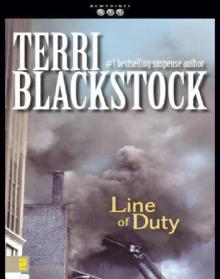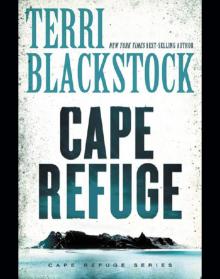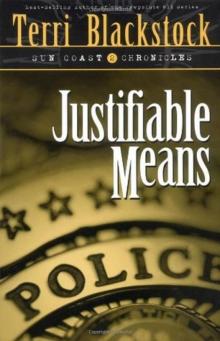- Home
- Terri Blackstock
Evidence of Mercy Page 3
Evidence of Mercy Read online
Page 3
“But right now there’s no one who cares that you’re probably about to die. You’re just as alone as I am.”
“There are worse things than dying alone!” Lynda threw back at him.
“Are there?” His voice softened by degrees, and as he looked out the window at the activity on the tarmac below them, he said, “Right now it seems to me that the worst thing in the world is. . . .”
“What?” she asked. “What is the worst thing in the world?”
“Dying with a total stranger.”
The reality of that concept knocked the breath from her, and she fought the conflicting feelings assaulting her. As her first tears fell, they were both quiet, embroiled in battle with their own raging thoughts.
Her tears softened him, and finally, he let out a long, weary breath. “You’re right, you know. There’re at least three women who would like to see me burn.”
“They probably have good reason,” she whispered.
“Yeah, probably. I guess if you condemn a man for not wanting to tie himself to one woman for life, I deserve what I get.”
“Life isn’t really that long, though, is it?”
“Not lately,” he said.
He looked out the window, searching the area around the airport. “If we could just find a pasture or something to land in. If we landed in the dirt, it would cut down on the fire hazard.”
“The joys of flying in this part of Florida. Nothing but pavement and swamp. And the swamp has too many trees for a water landing.”
“It might not be so bad if the gas tank weren’t so low. I think I could get us down on the belly, maybe without cartwheeling, but the sparks could start a fire.”
“Maybe they won’t,” she whispered with her last vestige of hope.
“Maybe not,” Jake whispered. “I’ve still got a lot of living to do.”
CHAPTER THREE
* * *
On the ground, Mike looked at the plane through his binoculars again, wishing for a miracle. But the landing gear was still unevenly dropped and only partially down. Dropping the binoculars around his neck, he waved an arm, directing the planes that were moving, one by one, from their parked positions on the tarmac. The red Porsche sat right in the way, and for a moment, he thought of driving it out to the middle of Runway 4 so that Jake would have to run over it himself. It would be poetic justice.
Then he quelled the thought and checked to see whether the keys were in the ignition. Waving to one of the men nearby, he said, “Get this car out of the way, will you?”
Sirens drew closer, and he ran to the end of the building and parted the growing crowd of spectators to direct the fire trucks onto the tarmac. Three of them whizzed past him, lights flashing. Then there were the ambulances—one, two, three, four—and he realized with a sinking stomach that they were preparing for additional casualties on the ground.
He started back to the planes taxiing out of the way and saw a van pull in behind him. It was a media van with the call letters WTTV on the side. The van slowed beside him, and a reporter he recognized from the six o’clock news jumped out. “We heard on the police radio that there’s a plane about to crash.” He pointed up to the plane circling overhead. “Is that it?”
“Stay back,” Mike ordered as he kept walking. “Don’t get any closer to the runway and move the van.”
“Man, I need it right here.”
“I’m telling you, when that plane hits the ground, it’s liable to blow from here to Montana. Don’t say I didn’t warn you!”
“Have you been in contact with the pilots?” the reporter asked.
But Mike didn’t answer. He had too much work to do.
The trees beyond the airport were greener than Lynda thought they should be in September, probably because they’d had so much rain this summer. She wondered now why she hadn’t noticed that stark, clear color before. Only now was she even aware that those trees existed. Of course, this landing was different. This time the plane might not stop until it reached them.
Between two lines of those trees, one on either side of the street leading to the small airport, she saw a convoy of vehicles that looked as small as toy cars heading to the gates. A shiver went through her. “Are those fire trucks?”
“And ambulances. Just waiting for us to hit bottom.”
“Don’t be so cynical. They’re there to help us.”
“There may not be anything left to help.” He tore his eyes away from the small square airport and checked the gauges. Lynda followed his eyes and noted that they’d used up half of their fuel already.
“If you’ve already given up, maybe I should land the plane after all.”
“No. If there’s a chance of getting us out of this alive, I’m the one who can do it.”
Disgusted, she gaped at him. “Has it ever occurred to you that you’re not the final authority in all this?”
“No? Then who is?”
“Oh, that’s right,” she said. “You don’t believe in God. You’ve got the world all figured out.”
“I’m not into myths,” he said. “I like facts. And what is there to figure out, really? You’re born, you live, you die. End of story.”
“It’s not the end of the story,” she said. “There’s an afterlife.”
He laughed then and shook his head. “Wouldn’t that be convenient?”
She bristled. “Convenient?”
“Yeah. Tell yourself a little lie just before you crash, and maybe you’ll feel better about giving it all up.”
She opened her mouth to argue but changed her mind and wearily leaned back. “Believe what you want. You’re not worth trying to convince.”
The steady, muffled hum of the engine became the only sound in the cabin again, and their eyes strayed to the concrete square below them where mechanics, pilots, and staff ran up and down the tarmac. Half of the planes had been moved already, and the other half taxied out in a single stream of traffic, like toy planes strung together and dragged by a toddler. It looked orderly and peaceful from here, not at all like a rushed attempt to prepare for a tragedy.
The air seemed thinner now than she remembered it being before, and she longed to roll a window down as she would in a car. But even if that had been a reasonable thing to do at 10,000 feet, moving 100 miles per hour, the windows weren’t built to budge. The vessel that had once been her refuge was now just a cage.
Jake seemed to be struggling with his own thoughts. Swallowing, he wiped his brow and glanced at her. “So how long since your father died?”
Wondering where that question had come from, Lynda reluctantly answered, “Three months.”
“I’m sorry,” he said quietly.
It was true that losing her father had been tough, but she couldn’t say it was the death itself that had grieved her. Instead, it was the “what-might-have-been’s” that had assaulted her when she’d buried him. The relationship they could have had. The one she had been too busy to maintain.
“You don’t want to talk about it,” he said quietly. “No problem. I’m just trying to get our minds off this.”
She shook her head. “It’s all right. I just can’t think right now. It’s so quiet up here—so normal. The engine’s running like a charm; everything’s intact. It’s hard to believe that this landing is gonna do us in. But look at them down there. They know it. That’s why they’re hurrying around, getting ready for the worst case.”
“Yeah,” he said, “and none of them knows the first thing about us.”
She turned back to him, and saw the first trace of vulnerability she’d seen. “Would it make any difference if they did?”
“There might be some comfort in knowing there was somebody down there who had a stake in whether we made it through this.”
“It wouldn’t help us land any smoother,” she whispered.
“I don’t know,” he said. “It might.”
Why his words frightened her, she wasn’t sure. “Are you saying you’d take more care in the landin
g if you knew someone cared about you? That just because neither of us has close attachments, it doesn’t matter if we crash?”
“No! I don’t have a death wish.”
“Well, that’s the second time you’ve said something pretty negative about our landing. I’m starting to get really scared that you might just give up and let us die. Is that what you’re saying?”
“Of course not! I don’t know what I’m saying, okay? I just wish. . . .” His voice trailed off, and he found it difficult to center his thoughts. “I mean, doesn’t this make you feel . . . something? Incomplete? Regret?”
A still, small voice reminded her what she knew—or what she had once known—about completion, about regret. The memories were vague from lack of use, and she couldn’t share them with him for fear that he would mock her and throw the words back in her face.
“You must feel that way,” he said. “I mean here you are in a busted plane called Solitude, telling your secretary to cancel your appointments. Not the makings of a full life.”
The voice in her heart died, and she let her old, human voice speak instead. “You have a lot of room to talk.”
“I know. Maybe I’m thinking that if I can figure you out, I can figure me out.”
“Hey, there’s nothing wrong with me. I’m a loner, okay? I have everything I need.”
“Do you?” he asked.
“Yes. No surprises, no letdowns. No one to disappoint me.”
“So you’ve eliminated the lows. But that also means there are no highs.”
Those words might have been her own. But the ego part of her, the part that held pride to her breast like a shield, dismissed them. “That’s why I fly.”
“A woman who spends all her free time alone in an airplane strikes me as someone who’s hiding from something.”
“Oh, brother,” she groaned. “You’ve got a lot of nerve, you know that? Driving up in your yup-mobile with your diamonds flashing and your arrogance dripping off you like cheap cologne—How dare you make any judgments about me?”
“I’m not. I’m making an observation.”
Furious, she jerked the microphone off its hook. “Come in, Mike. This is Cherokee 1–2 Delta. I’m ready to land right now! Do you read me?”
Jake grabbed her arm. “What do you think you’re doing?”
But Mike’s answer came quickly. “Negative, Lynda. We’re not ready.”
“How long are you going to keep us up here?”
“Until we’ve taken every precaution! Do not land until I give you the go-ahead! Do you read me?”
Lynda wiped away another tear. “Loud and clear.”
Slamming the radio down, she covered her face and told herself to calm down. She was letting this man dig at her in the painful, bruised places she’d been shielding for so long, and suddenly she wished she could just be alone to face her life—and her death.
“Look, I’m sorry,” Jake said quietly. “I didn’t mean to send you off the deep end.”
“Just shut up, will you? You’re not making this any easier. If you’re so interested in figuring someone out, maybe you should do a little self-analysis. Why are you all alone in the world?”
He hesitated only a moment, and his voice was flat when he answered. “Simple. Because I’m a selfish pig.”
“Now, there’s an unexpected revelation. I guess fear of death brings out the truth.”
“Too much maybe,” he said sullenly. “Too late.”
She let those words sink in and wondered if she’d gotten to the point of honesty yet. Had she missed the chances she’d had to face the truth? Would she get another chance?
That small voice prompted her again to tell him it wasn’t too late, but the voice was growing more distant and easier to ignore.
“We’re going to make it, you know,” Jake said. “Together, we can do this. We’re both experienced pilots, and neither of us wants to die.”
She tried to imagine the plane landing carefully, easily, and without incident, but the possibility seemed too remote. “But neither of us has tried to land metal to pavement with no brakes in a crosswind.”
“Talk about looking at the bright side,” he muttered. He glanced at her. “You’re shaking.”
“So are you,” she pointed out.
“I’m scared.”
Lynda wasn’t sure why those two matter-of-fact words, uttered by such a tough, hard man would shake her so, but she wilted and surrendered to her tears. “I’m scared, too,” she whispered.
He reached over and took her hand, and something about that touch comforted her. Their eyes met, a moment of connection, where she thought she knew him, and he thought he knew her, a moment when they ceased to be strangers.
“Cherokee 1–2 Delta—St. Clair Unicom. Come in, Lynda.”
Jake let go of her hand, and she grabbed the mike, bracing herself. “1–2 Delta. Go ahead, Mike. Are you ready for us?”
“Affirmative. You can land now, guys,” Mike said softly. “Just watch that crosswind, and be careful. I wish I could offer you something in the way of advice, but you know what to do. I’ll be praying for you guys down here.”
Lynda swallowed and wiped her eyes. “Yeah. Thank you, Mike.”
She put the radio back on its hook and looked at Jake, who was staring dully out the window. His face was empty, drained, and for a moment she thought he might cry too. She wished he would so that she could fully surrender to her own emotions and wilt outwardly the way she was wilting inside.
Finally, he looked at her, reached across to touch her face, and whispered, “Are you ready?”
“Yeah,” she said. “You?”
“As ready as I’ll ever be, I guess.” He checked the gauges, then said, “Once we’re on short final and know we’ve got the runway made, kill the engine and cut all the switches. And if you can, unlatch the door so we can get out fast.”
In a gesture that surprised her, he leaned over and tested her seat belt then checked his own. “All right,” he said. “Here goes.”
The plane descended smoothly like any other craft coming in on any other day, but Mike knew that the moment it touched down the problems would begin. He eyed the rolling cameras and the reporter with his microphone in hand, waiting to get every gory frame.
The ambulances were in place, ready to speed to the scene, and the fire trucks were standing by. Mike felt a wave of dizziness and shook it away, telling himself this was no time for panic. There was too much that had to be done.
He brought the binoculars to his eyes as the plane narrowed the distance between the sky and the runway, and under his breath, he prayed for a miracle.
The plane touched down, sending a spray of sparks as it scraped down the runway—too fast, like a speedboat on an open sea. When it fishtailed, Mike dropped the binoculars.
For several seconds that stretched into eternity, the plane cart-wheeled across the runway, rolling and sliding, breaking a wing here, losing the tail there, leaving pieces in its wake, until it finally rolled to a deadly halt on its side.
The ambulances and fire trucks launched across the runways. Stricken with dread and terror, Mike ran toward what was left of the plane.
CHAPTER FOUR
* * *
Across town in the law offices of Schilling, Martin and Barrett, Sally Crawford rushed to type the three motions that Lynda needed ready for court the next morning. As much as she managed to accomplish each day, it was clear to her that Lynda needed a second secretary. Sometimes things moved so fast that she had to run just to stay in place.
But it was tough convincing a workaholic that you were working too hard. As long as Sally’s fingers flew across that keyboard, and the phone calls were answered, and the motions were filed, and the appointments were made, and the office ran smoothly, Lynda was happy.
She shouldn’t complain, Sally admitted as she punched in the command to print then swiveled in her chair and began stacking the papers that had to be ready before the mail boy came around to empty
the “out” baskets.
The phone buzzed; she picked it up. “Lynda Barrett’s office.”
“Sally, there’s a Paige Varner here to see Lynda.”
“Lynda’s not in,” Sally told the receptionist who intercepted visitors as they came in. “Take a message, and I’ll have Lynda call her.” Hanging up, she saw that the printer was finished, and she pulled out the pages.
The phone buzzed again. “Lynda Barrett’s office.”
“Sally, she says she’s left messages, and Lynda hasn’t called. She’s pretty upset—”
Sally moaned. “All right. Send her back. I’ll talk to her.”
She hung up and sat for a moment, staring at the phone, wondering what excuse she’d use to cover for Lynda this time. The plain, simple truth was that Paige Varner’s was a pro bono case, and it wasn’t exactly one of Lynda’s top priorities.
She saw the elevator doors open, and Paige bolted off, clutching her three-year-old daughter, Brianna, on her hip. Paige’s eyes were swollen and red as she cast Sally a frantic look and started toward her.
Sally got up to meet her. “Hello, Paige. Lynda’s not here.”
“I’ve got to talk to her,” Paige said, starting to cry. “We’ve got to do something. He tried to kidnap Brianna!”
“Who?” Sally asked, leading her to a chair and making her sit down. Brianna’s feet hit the floor, but Paige pulled her into her lap, unable to let her go.
“Her father,” she said. “Do we have a court date yet? If we do, I can make plans to leave the state, so he won’t know where we are—”
“Calm down,” Sally said, stooping in front of her. “Now start over. Take a deep breath and tell me what happened.”
Paige didn’t want to take time to start over, but she tried. “Her day-care teacher called me at work and told me that Keith was there claiming that I told him to pick her up.”
“Wait a minute. Don’t you have a restraining order?”
“Yes!” Paige cried. “But it’s worthless!We’re not safe here! I have to talk to Lynda. If she can get us a court date, then I can get that over with and get out of town, before he takes her, or comes after me again, or—”

 Aftermath
Aftermath Shadow of Doubt
Shadow of Doubt Second Chance - 05 - Never Again Good-Bye
Second Chance - 05 - Never Again Good-Bye Miracles
Miracles Broken Wings
Broken Wings the Cape Refuge (Cape Refuge Series Book 1)
the Cape Refuge (Cape Refuge Series Book 1) Shadow in Serenity
Shadow in Serenity Distortion (Moonlighters Series)
Distortion (Moonlighters Series) Second Chance - 02 - When Dreams Cross
Second Chance - 02 - When Dreams Cross True Light
True Light Private Justice
Private Justice Last Light
Last Light Downfall (An Intervention Novel)
Downfall (An Intervention Novel) Distortion: Moonlighters Series: Book Two
Distortion: Moonlighters Series: Book Two Evidence of Mercy
Evidence of Mercy If I Run
If I Run Southern Storm
Southern Storm Ulterior Motives
Ulterior Motives Emerald Windows
Emerald Windows River's Edge
River's Edge Intervention
Intervention The Heart Reader
The Heart Reader Line of Duty
Line of Duty Twisted Innocence
Twisted Innocence When Dreams Cross
When Dreams Cross Downfall
Downfall Cape Refuge
Cape Refuge Breaker's Reef
Breaker's Reef Night Light
Night Light Double Minds
Double Minds Justifiable Means
Justifiable Means Covenant Child
Covenant Child If I Live
If I Live If I'm Found
If I'm Found Vicious Cycle
Vicious Cycle Presumption of Guilt
Presumption of Guilt Trial by Fire
Trial by Fire Word of Honor
Word of Honor Second Chance - 03 - Blind Trust
Second Chance - 03 - Blind Trust Blind Trust
Blind Trust Twisted Innocence (Moonlighters Series Book 3)
Twisted Innocence (Moonlighters Series Book 3) Predator
Predator Dawn's Light
Dawn's Light Chance of Loving You
Chance of Loving You Truth-Stained Lies
Truth-Stained Lies Never Again Good-Bye
Never Again Good-Bye Catching Christmas
Catching Christmas